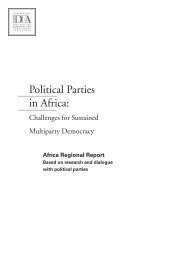Seminar Report The role of Political Parties in Democratic Transitions
Seminar Report The role of Political Parties in Democratic Transitions
Seminar Report The role of Political Parties in Democratic Transitions
Create successful ePaper yourself
Turn your PDF publications into a flip-book with our unique Google optimized e-Paper software.
A critical challenge <strong>in</strong> the process was f<strong>in</strong>d<strong>in</strong>g a balance between the fears <strong>of</strong> the white m<strong>in</strong>ority<br />
(prosecution, persecution, loss <strong>of</strong> property etc.) and the aspirations <strong>of</strong> the black majority (universal adult<br />
suffrage, proportional representation, share <strong>in</strong> economic wealth, nationalisation <strong>of</strong> national assets,<br />
redistribution <strong>of</strong> wealth). <strong>The</strong>se issues were dealt with though dialogue and compromise. No side got all it<br />
wanted and both sides made important concessions. S<strong>in</strong>ce the successful political negotiations, the<br />
government has made tremendous progress but corruption slows down the process. <strong>The</strong> democratic<br />
dividend, ensur<strong>in</strong>g that the political reforms also translate <strong>in</strong>to real changes <strong>in</strong> people’s lives, is slow <strong>in</strong><br />
com<strong>in</strong>g.<br />
<strong>The</strong> key <strong>of</strong> the peaceful accommodation <strong>in</strong> South Africa can be summarised <strong>in</strong> the follow<strong>in</strong>g po<strong>in</strong>ts:<br />
1. All sides had to make compromises on their demands and expectations.<br />
2. Accommodat<strong>in</strong>g both the fears <strong>of</strong> an oppressive m<strong>in</strong>ority and the aspirations <strong>of</strong> a marg<strong>in</strong>alised<br />
majority.<br />
3. Constitutional and <strong>in</strong>stitutional guarantees for those giv<strong>in</strong>g up their monopoly balanced aga<strong>in</strong>st the<br />
demands <strong>of</strong> a deprived majority.<br />
4. <strong>The</strong> pivotal <strong>role</strong> <strong>of</strong> build<strong>in</strong>g trust between the negotiat<strong>in</strong>g partners <strong>in</strong>clud<strong>in</strong>g personal relationships for<br />
a mutually acceptable accommodation.<br />
5. Demilitarization and transformation <strong>of</strong> the liberation movements <strong>in</strong>to organised political parties, has<br />
helped to consolidate the transition.<br />
6. <strong>The</strong> <strong>role</strong> <strong>of</strong> courageous, visionary and conciliatory leadership on both sides. 'Grand gesture' to unlock<br />
the democratic stalemate and create the space for negotiation.<br />
7. <strong>The</strong> transition rema<strong>in</strong>s <strong>in</strong>complete.<br />
<strong>The</strong> presentation was followed by comments by the discussant who noted the similarities and common<br />
ground between the transition <strong>in</strong> Myanmar and South Africa. She questioned if Myanmar found itself <strong>in</strong><br />
partial or full transition and if it was enough to stop at multiparty democracy or if the country should go a<br />
step further and strive for a federal system <strong>of</strong> governance to ensure that the voices <strong>of</strong> all ethnic groups are<br />
sufficiently heard.<br />
Dur<strong>in</strong>g the ensu<strong>in</strong>g discussion, participants raised questions such as: How can non-parliamentary parties<br />
play a <strong>role</strong> <strong>in</strong> a democratic transition to ensure that a susta<strong>in</strong>able political settlement is reached? What are<br />
the advantages <strong>of</strong> South Africa’s list system <strong>of</strong> vot<strong>in</strong>g over a quota system for m<strong>in</strong>ority groups? Will a<br />
system <strong>of</strong> proportional representation ensure more female candidates? How can ethnic and cultural<br />
groups be accommodated to safeguard diversity and at the same time, move beyond ethnic identity and<br />
put national identity to the forefront?<br />
Mr. MacKay responded to the questions asked, amongst others by expla<strong>in</strong><strong>in</strong>g the process <strong>of</strong> trust build<strong>in</strong>g<br />
between ethnic groups <strong>in</strong> South Africa. He stated that is important for different groups to sit together <strong>of</strong>ten<br />
so they can realise that they have more to lose when they act <strong>in</strong>dividually <strong>in</strong>stead <strong>of</strong> work<strong>in</strong>g together.<br />
1.6. Summary Presentation on: “<strong>The</strong> complexities <strong>of</strong> deepen<strong>in</strong>g democracy: the case <strong>of</strong> Nepal”<br />
By Mr C.K. Lal, Nepalese <strong>Political</strong> Commentator<br />
Discussant: Mrs Ardeth Thawnghmung, Pr<strong>of</strong>essor, University <strong>of</strong> Massachusetts-Lowell<br />
Mr C.K. Lal drew up the complexities <strong>of</strong> the multiparty democracy <strong>in</strong> Nepal and described the journey <strong>of</strong><br />
Nepal towards democracy allud<strong>in</strong>g to many issues and <strong>in</strong> particular the sem<strong>in</strong>ar themes <strong>of</strong> strengthen<strong>in</strong>g<br />
party politics and establish<strong>in</strong>g multiparty dialogue around the constitution. He highlighted how Nepal<br />
rema<strong>in</strong>ed almost closed to the outside world for nearly 150 years. Follow<strong>in</strong>g a brief flirtation with<br />
parliamentary democracy and constitutional monarchy <strong>in</strong> the 1950s, parliament was dissolved <strong>in</strong> a royalmilitary<br />
<strong>in</strong> 1960. It took 30 years <strong>of</strong> struggle to restore multiparty democracy and Nepal got a new<br />
constitution <strong>in</strong> 1990. Follow<strong>in</strong>g 10 years <strong>of</strong> armed <strong>in</strong>surgency and three years <strong>of</strong> royal-military rule,<br />
parliamentary parties jo<strong>in</strong>ed hands with the Maoists and succeeded <strong>in</strong> overthrow<strong>in</strong>g the monarchy <strong>in</strong><br />
2008.<br />
8
















